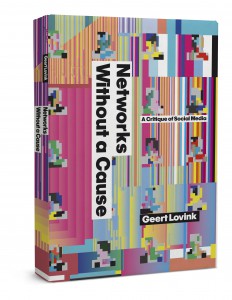Networks Without a Cause, A Critique of Social Media by Geert Lovink (forthcoming January 2012)
BOOK
 Author: Geert Lovink
Author: Geert Lovink
Publisher: Polity Press 2012
Design: Studio Leon Loes
With the vast majority of Facebook users caught in a frenzy of friending’, ‘liking’ and ‘commenting’, at what point do we pause to grasp the consequences of our info-saturated lives? What compels us to engage so diligently with social networking systems? Networks Without a Cause examines our collective obsession with identity and self-management coupled with the fragmentation and information overload endemic to contemporary online culture.
With a dearth of theory on the social and cultural ramifications of hugely popular online services, Lovink provides a path- breaking critical analysis of our over-hyped, networked world with case studies on search engines, online video, blogging, digital radio, media activism and the WikiLeaks saga. This book offers a powerful message to media practitioners and theorists: let us collectively unleash our critical capacities to influence technology design and workspaces, otherwise we will disappear into the cloud. Probing but never pessimistic, Lovink draws from his long history in media research to offer a critique of the political structures and conceptual powers embedded in the technologies that shape our daily lives.
VIDEOS
Geert Lovink discusses his book: Networks Without a Cause
Videos: produced by Linda Wallace and shot & camera and editing by Emile Zile
Interviewer: Morgan Currie
Critique of Social Media
[vimeo]http://www.vimeo.com/25357972[/vimeo]
Most participatory platforms emphasize a model of weak links (think ‘friends of friends’) that attract a community just to ‘hang out’, conveniently for the corporations that exploit our social relationships. Organized networks should be seen in opposition to these social sites and are based on people joining together for a common purpose, building strong-ties among dispersed people, and bringing goal-driven organizing to the internet.
Networks Without a Cause employs net criticism to produce new concepts such as org nets that can scale up out of the blue and bring transformations in the vein of the revolts in Tunisia and Egypt.
Politics of Wikileaks
[vimeo]http://www.vimeo.com/25355901[/vimeo]
Wikileaks is an example of a critical concept that blows up from the confinements of web 2.0 and participatory culture. There’s no wiki involved, users are not redacting documents. What’s interesting isn’t Wikileaks itself but how it facilitates whistle blowers to give up sensitive documents online. The big shift is tightened security online, but also more projects that use software and digital media to create a powerful, disruptive phenomena.
Aesthetics of Online Video
[vimeo]http://www.vimeo.com/25355638[/vimeo]
Online video provides a social, mobile way of watching, and its database structure can be seen as allowing a proactive audience. But what are the constraints of YouTube, and what alternative platforms of online watching could we see moving ahead?
Society of the Query: From Link to Like
[vimeo]http://www.vimeo.com/25355332[/vimeo]
How can we make the politics of the algorithm and culture of search more transparent? How is search influencing our lives? The tremendous switch from learning and memorizing to searching changes our relationship to knowledge. What would alternative search engines look like, and what ethics could they reproduce? How are social network’s recommendation engines (do you ‘like’ my song?) treading into the territory of search?
Anonymity, Facebook and Information Overload
[vimeo]http://www.vimeo.com/25353458[/vimeo]
Today our intense cultivation of a singular self is tied up in the drive to constantly produce and update. The image is one of a safe intimate space, but what are the new risks for users as political actors and producers of exploitable data? What possible responses could we have to these online identity traps – should we leave altogether or return to new cultures of anonymity as creative or subversive play?
Also how should we respond to the pressure for constant, real-time presence? We could exercise self-mastery of our devices and promote smart design as we integrate them into our lives.
Principles of Net Criticism
[vimeo]http://www.vimeo.com/25349247[/vimeo]
Contemporary critics too often comment from the sidelines. Networks Without a Cause by Geert Lovink (Polity 2012) instead sees criticism as productive for its capacity to develop alternative concepts that can be implemented in design – for this reason the critic’s relationship with coders and artists is important. Yet how do these fluid ideas take hold and scale up? How do theorists keep their ideas relevant in the so-called age of hyperspeed? Net criticism responds this fundamental issue by claiming that we should not only theorize about our state, but actively steer it – moving beyond the outsiders perspective towards real strategies of collaboration and cooperation.

